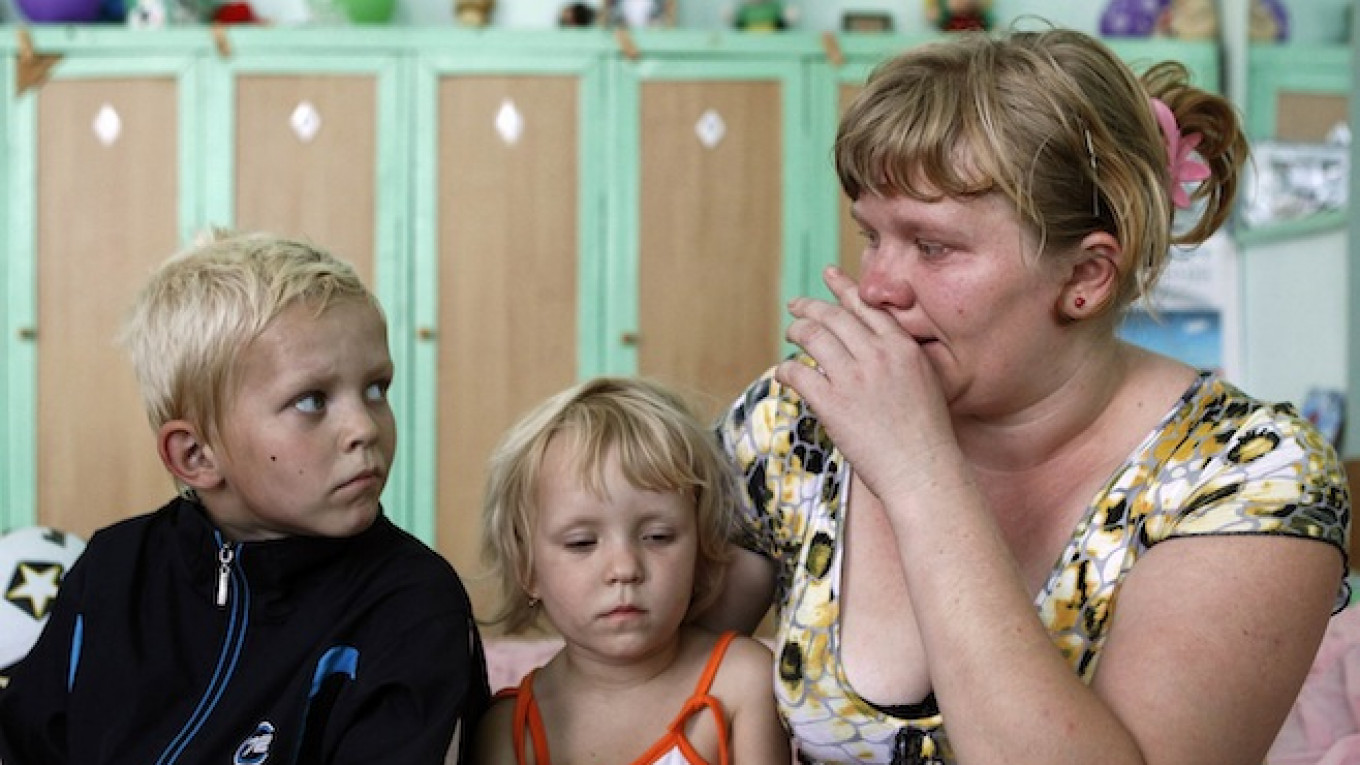Investigators are speaking to all Ukrainian citizens who moved to Russia following the outbreak of violence in their homeland, and are questioning them on the positions and tactics of their country's army, as well as any government offenses against civilians, a news report said.
The massive summonses are part of Russia's attempt to build a criminal case against Ukrainian forces and officials, Gazeta.ru reported Friday, citing an Investigative Committee spokesperson.
"We are questioning everyone: refugees, as well as those whose relatives remain in Ukraine, and those who have already received permits for temporary stay in Russia — everyone," an Investigative Committee spokesperson was quoted as saying.
A report released last week by UN refugee agency UNHCR placed the number of Ukrainians who had fled to Russia at 110,000, with another 54,000 displaced inside the country — about 12,000 of them fleeing the Crimea peninsula that Russia annexed in March.
The Ukrainian and Western governments have blamed the violence that is causing people to flee eastern Ukraine on Russia's support for pro-Moscow separatists in the region, with the West repeatedly urging Russia to "de-escalate," and Ukrainian Prime Minister Arseniy Avakov accusing Russia of exporting "terrorism" into his country.
Avakov, along with Dnepropetrovsk regional Governor Ihor Kolomoisky — a banking tycoon whom Moscow accuses of war crimes, aggravated murder and kidnappings, according to Voice of Russia — are targets in the large-scale questioning of Ukrainians, Gazeta.ru reported, citing an Investigative Committee spokesperson.
Some of the Russian investigators' questions also refer to the locations of Ukrainian military bases and the interviewees' personal views about the Ukrainian government, Gazeta.ru reported.
While asking asylum-seekers about their political views may be common practice in many parts of the world, asking civilians about military positions— particularly in a country where the host nation is not technically at war — seems slightly less so.
A Ukrainian woman living in Moscow, who was interviewed on condition that her real name be withheld from publication, said she was recently "frightened" by a phone call from an Investigative Committee officer telling her to come in the next day to file testimony in connection "with the military activities on the territory of Ukraine," Gazeta.ru reported.
The woman said investigators questioned her about her family members in eastern Ukraine; asked her what she knew about the fighting; whether she knew which civilian facilities the Ukrainian army might be using; whether she had seen any killings, destruction of homes or military attacks against refugee convoys; and whether she believed that those "crimes" had been intentionally planned by the Ukrainian government, the report said.
Investigators appeared to have a several pages' worth of questions, but cut the questioning session short after learning that the woman had moved to Moscow more than six months ago — months before the fighting in eastern Ukraine broke out — the report said.
An Investigative Committee spokesperson said the massive questioning was part of a search for evidence against Ukrainian officials, including Kolomoisky, on charges of "using banned weapons and methods of war," Gazeta.ru reported.
The testimonies are "our instruments," an Investigative Committee spokesperson was quoted as saying. "We are interrogating [Ukrainians] to understand whether these people have claims and grounds to be granted the status of victims in a criminal case."
So far, some 2,700 Ukrainians have been categorized as "victims," the report said.
A leader of the Memorial human rights group, Svetlana Gannushkina, called Russia's lines of questioning "illegal," Gazeta.ru reported.
"I am sure there is a colossal difference between what people say, and what really happened," she said. "Such testimony should be treated very cautiously. People are frightened, some are running away from a war, some have heard everything from relatives who have stayed there. In the end, everything is blown up into incredible rumors. How are investigators going to check that out on the territory of another country?"
Gannushkina told Gazeta.ru that she had heard war "fables" about massive massacres in Ukraine, about U.S. soldiers taking hostages in eastern Ukraine, and about Russian soldiers there doing the same thing — all testimonies that have never been confirmed.
"I think the investigators have begun a very strange endeavor," Gannushkina was quoted as saying.
See also:
Russian Investigators Target Ukraine Minister in 'Organized Murder' Probe
A Message from The Moscow Times:
Dear readers,
We are facing unprecedented challenges. Russia's Prosecutor General's Office has designated The Moscow Times as an "undesirable" organization, criminalizing our work and putting our staff at risk of prosecution. This follows our earlier unjust labeling as a "foreign agent."
These actions are direct attempts to silence independent journalism in Russia. The authorities claim our work "discredits the decisions of the Russian leadership." We see things differently: we strive to provide accurate, unbiased reporting on Russia.
We, the journalists of The Moscow Times, refuse to be silenced. But to continue our work, we need your help.
Your support, no matter how small, makes a world of difference. If you can, please support us monthly starting from just $2. It's quick to set up, and every contribution makes a significant impact.
By supporting The Moscow Times, you're defending open, independent journalism in the face of repression. Thank you for standing with us.
Remind me later.


